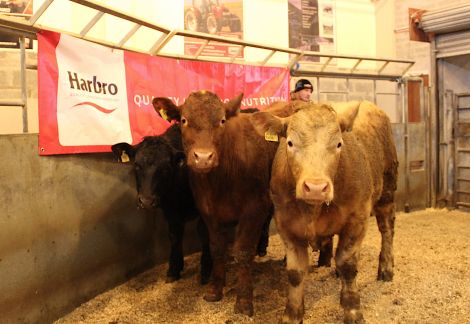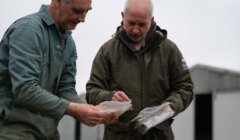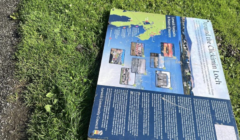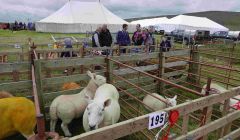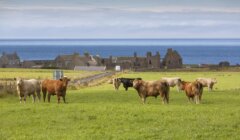Business / CAP reform review welcomed but ‘does not go far enough’
A REVIEW that promises fairer funding for farmers throughout the UK following Brexit has been welcomed, but claims have been made that the reforms do not go far enough.
Scottish rural economy secretary Fergus Ewing called for all the money that the UK has secured from the EU in a “convergence uplift” to go to Scottish farmers – whose economic plight made the cash award possible in the first place.
The National Farmers Union in Scotland said that nothing was being done to address losses suffered by Scottish crofters and farmers since the uplift in 2013 and that whatever came from the review should provide a baseline for future allocations beyond 2022.
The review, led by Lord Bew of Donegore, will provide recommendations for how the annual amount of convergence funding is fairly split between the four UK countries in the remainder of this parliament once the UK has left the Common Agricultural Policy (CAP).
The “independent advisory panel” will consider previous allocations but won’t redistribute money that has already been committed – apparently ruling out a re-allocation of funds since the 2013 uplift.
It will look at what factors should determine the distribution of agriculture funding between England, Scotland, Wales and Northern Ireland.
Environmental, agricultural and socio-economic factors will be taken into account as well as farm numbers and sizes “to make sure all parts of the UK are treated fairly”.
The EU Multi Annual Financial Framework set out the aim of redistributing CAP payments more equitably across the EU based on an average €/hectare.
Under the framework, all countries receiving less than 90 per cent of the EU average would receive a funding uplift. According to the Scottish Government, the UK only qualified for an uplift because Scotland’s payment was only 45 per cent of the EU average. England, Wales and Northern Ireland are all above the 90 per cent qualifying threshold.
Ewing said that he was disappointed the terms of the review had been announced before he had got an answer to his concerns that the “remit for the review had been significantly watered down from what was previously agreed”.
Become a member of Shetland News
Ewing added: “This review must not simply be an exercise in playing for time in delivering funding to Scotland’s farmers which is rightfully theirs.
“The only reason the UK, as the member state, qualified for an uplift is because of Scotland – therefore, the only fair funding solution for Scottish farmers and crofters is for them to receive the £160 million in convergence funding due to them. Anything less than this is completely unacceptable.”
NFU Scotland echoed Ewing’s comments saying that the announcement was “long overdue” and that the UK’s uplift was awarded as a result of Scotland’s very low payment rate per hectare.
NFU Scotland’s director of policy Jonnie Hall said: “As a consequence, the UK is in the process of receiving an extra €223 million (or about £190 million) over a six-year period.
“Since 2013, NFU Scotland has written to successive secretaries and ministers of state at the Department for Environment, Food and Rural Affairs; HM Treasury; and the Scotland Office calling for a review of the 2013 decision to split the convergence dividend on historic lines.
“A key principle has always been that a review must be carried out on objective and non-discriminatory lines, taking into account Scotland’s lower-than-average payment rate via a review and eventual reallocation of intra-UK CAP funding.
“Today’s announcement is long overdue. Whilst it is an important step forward in recognising that there is an equitable intra-UK allocation of domestic farm support funding to the end of this parliament, it is bitterly disappointing that the review will not redress the funding which Scottish farmers and crofters have lost out on since this decision was implemented in 2014.
“Since the 2016 EU referendum UK ministers also made clear to NFU Scotland that any future review would also address the framework for agricultural spending post-Brexit and our ultimate departure from the CAP. What has emerged in today’s terms of reference will not deliver on that.
“This review must be about agreeing the baseline for future funding allocations beyond the current parliament and existing UK Government commitments to 2022. This baseline is an essential cornerstone on which Scotland will build its future agricultural policy.”
Lord Bew will be joined on the panel by representatives from each devolved administration.
The government says that its arrangements for overall funding for UK farm support provide more certainty than any other EU member state.
Environment secretary Lord Gove said: “We are committed to making sure that future funding is fairly allocated, and are also confirming that the Government won’t simply apply the Barnett formula to Defra’s funding beyond this parliament.
Secretary of State for Scotland David Mundell said that the UK Government was committed to delivering “fair funding for farmers” and had already guaranteed the same cash total for farm support in all parts of the UK until 2022.
He added: “This review is an opportunity to ensure the challenges Scotland’s unique landscape brings are fully recognised in future farm support allocations.
“Under the present arrangements, Scotland receives twice as much money for farming support than might be expected were the Barnett formula alone to be used. The commitment that future agriculture funding will not simply be Barnettised should be welcomed across the board.
“This reinforces our commitment to Scottish farmers and I urge the Scottish Government to stop keeping them in the dark about its plans for the future of agriculture in Scotland.”
The review will conclude prior to the 2019 spending review with the aim of informing future funding decisions.
Become a member of Shetland News
Shetland News is asking its many readers to consider paying for membership to get additional features and services: -
- Remove non-local ads;
- Bookmark posts to read later;
- Exclusive curated weekly newsletter;
- Hide membership messages;
- Comments open for discussion.
If you appreciate what we do and feel strongly about impartial local journalism, then please become a member of Shetland News by either making a single payment, or setting up a monthly, quarterly or yearly subscription.






